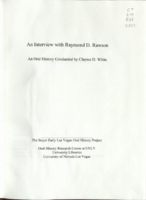Search the Special Collections and Archives Portal
Search Results

Transcript of interview with Sharon Walker by Barbara Tabach, October 8, 2014
Date
Archival Collection
Description
Sharon Walker is a real estate investor, retired stockbroker and former loan officer. She was born on December 8, 1949 in Toledo, Ohio, and moved to Las Vegas with her family in 1963, where they started Walker Furniture, a store which they later sold to the Alterwitz family. Sharon's father, Julius Walker, was also in the casino business, becoming an owner of the El Cortez Hotel and Casino with Jackie Gaughan. Her mother, Anne Walker was a founding member of the first local Hadassah, The Women?s Zionist Organization. Sharon continues the family tradition of being active in Hadassah as well as being a Board Member of Jewish Family Service Agency. In November 2014 she was an honoree of Hadassah Leadership. In this interview, Sharon describes her adolescence in Las Vegas and the differences in culture as compared to her childhood in Toledo, Ohio. She also recalls the Walker Furniture business, her father?s careers, and her uncles Ed ?E? Walker and Lou ?Paddock? Walker.
Text

Transcript of interview with Richard "Curley" Francis by Connie Degernes, March 4, 1975
Date
Archival Collection
Description
On March 4, 1975, collector Connie Degernes interviewed truck driver and rigger, Richard L. (Curley) Francis (born on July 27, 1907 in Compton, California) in his home in Boulder City, Nevada. The main focus of this interview is the construction of the Hoover Dam. Mr. Francis discusses the various occupations he has held since relocating to Nevada, including, Cat Skinner, truck driver, cableway operator, rigger foreman, and crane operator. He also talks about working for the government and the Six Company in Las Vegas.
Text

Transcript of interview with Kathleen Bryan Gaston by Niki Rodriguez, March 17, 1981
Date
Archival Collection
Description
On March 17, 1981, Niki Rodriguez interviewed Kathleen Bryan Gaston (born 1949 in Las Vegas, Nevada) about her experience living in Southern Nevada. Gaston first talks about her father who moved to Las Vegas and eventually became a justice of the peace, and she also describes how her parents eventually moved to Las Vegas. Gaston later describes how Las Vegas looked as she was growing up and how it has developed since, specifically mentioning the schools she attended and the growth of the Las Vegas Strip.
Text

Russell K. Grater interview, March 15, 1995: transcript
Date
Archival Collection
Description
Interviewed by Dennis McBride; work with National Park Service including time at the Lake Mead National Recreation Area
Text

Transcript of interview with Vivian Harwell by Pamela Atkins, February 27, 1979
Date
Description
On February 27th, 1979, Pamela Atkins interviewed Vivian Harwell in Las Vegas, Nevada. Harwell begins the interview by explaining her reasons for moving to Las Vegas from Arkansas, and the type of living quarters that she had. She then goes on to talk about the recreation in Las Vegas in addition to the Nevada Test Site and local politics. The two later discuss the convenience of having local colleges available in Las Vegas and the availability of children’s activities in Las Vegas. The interview concludes with Harwell’s personal reflection on her time living in Las Vegas, and that she does not regret moving to Las Vegas.
Text

Transcript of interview with Ethel S. Hatch by P. Kohlman, November 24, 1975
Date
Archival Collection
Description
On November 24, 1975, collector P. Kohlman interviewed housewife, Ethel S. Hatch (born April 11th, 1914 in Valentine, Texas) in her home in Las Vegas, Nevada. This interview covers the history of Las Vegas from 1939 to 1975. Mrs. Hatch also talks about ranching in Nevada, Rex Bell, development on the Strip, the first hotels, and early local shopping culture. She refers to Block Sixteen as Block Thirteen when discussing the Red Light District. The interview concludes with discussion surrounding tree-lined streets, the Helldorado Club, and Fremont Street.
Text

Transcript of interview with Karen Hayes by Robert F. Darling, March 2, 1980
Date
Archival Collection
Description
On March 2, 1980, collector Robert F. Darling interviewed state assemblywoman, Karen Hayes (born October 16th, 1935 in Cedar City, Utah) in her home in Las Vegas, Nevada. This interview covers her personal history, the history of Las Vegas, and the local political environment. The gaming industry is also discussed, in addition to the Sagebrush rebellion and future local political projections and trends.
Text

Howard Heckethorn interview, March 2, 1977: transcript
Date
Archival Collection
Description
On March 2, 1977, Neil C. Dalmas interviewed teacher Howard Heckethorn, (born on September 14th, 1922 in St. George, Utah) at Red Rock Elementary School in Las Vegas, Nevada. This interview offers an overview of early education in Nevada. Mr. Heckethorn also discusses Stewart Ranch, Howard Hughes and the Hughes Site, and the migration of the Mormons to the Las Vegas area.
Text

Transcript of interview with Doris Evans by Lance Kenny, March 12, 1977
Date
Archival Collection
Description
On March 12, 1977, Lance Kenny interviewed realtor, Doris Evans (born in Dexter, Missouri) at her place of business, Doris Evans Realty, located at 1100 Cahlan Drive, Las Vegas, Nevada. This interview covers Boulder City and Las Vegas [1937-1977]. During the interview Doris discusses real estate, local hotels, early transportation, and social recreation. She also mentions the nuclear tests, crime, environmental changes, and marriage and family life in Boulder City and Las Vegas. Doris’s business partner, Patty (Renette Beringer), is also present during the interview and helps Doris recall the year they started Doris Evans Realty in Las Vegas, Nevada.
Text

Transcript of interview with Dr. Ray and Linda Rawson by Claytee White, October 30, 2009 and November 13, 2009
Date
Archival Collection
Description
Raymond Rawson's life started in the rural Utah community of Sandy in 1940. His family moved around in what he describes as a scene from John Steinbeck's The Grapes of Wrath. By the age of 10, the family settled in Las Vegas, which had a population of around 35,000. He attended Fifth Street Grammar School, Las Vegas High School, was a member of UNLV's first graduating class, and eventually became a dentist. In this interview, he reflects on his experiences of growing up in Las Vegas, the hardships of difficult economic eras, and his professional accomplishments in the field of dentistry, including actively advocating the creation of UNLV School of Dental Medicine. Ray also became a community leader. He served in the Nevada State Legislature from 1985 to 2001. He talks about his relationship with long-time legislator Joe Neal. Education and access to healthcare were among the issues that Ray championed and he shares his observations of these issues. In 2009, he was appointe
Text
